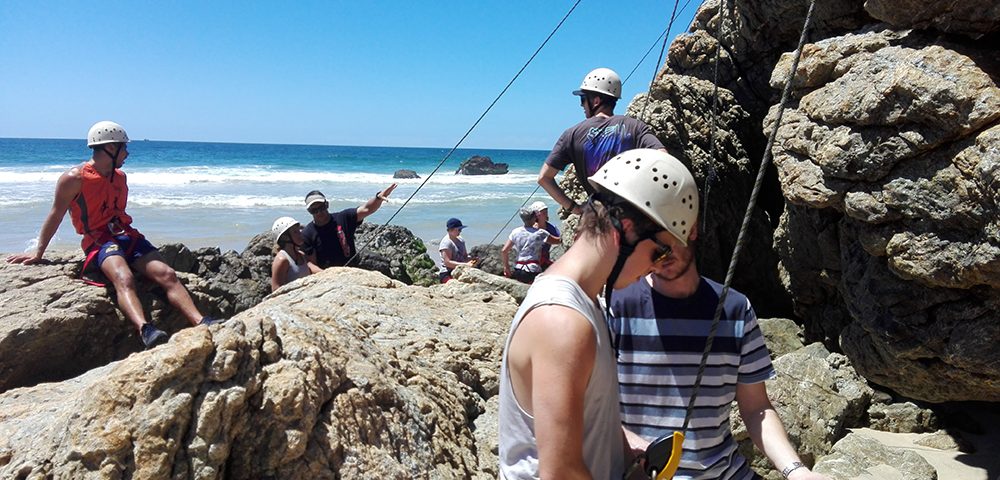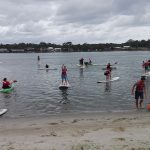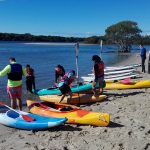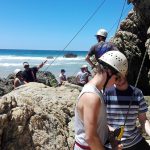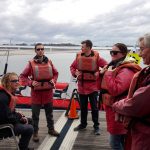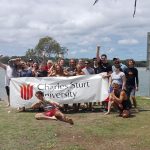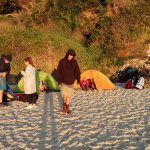But the real reason, says Dr Prue Gonzalez, Lecturer in the School of Environmental Sciences at Charles Sturt University’s (CSU) Port Macquarie Campus, “is that we’ve recently seen some pretty dramatic changes in the outdoor industry. It’s undergoing a process of professionalisation. And as a result, we’re seeing that it’s not just an industry for when you’re young; there are lifelong careers here.”
Part of the shift towards professionalisation has been the recognition that working in the outdoors is multidisciplinary in nature. “It’s not just about technical skills, says Gonzalez, “about knowing how to bushwalk or mountain bike or kayak. It’s also about understanding how the environment works. It’s about understanding the impacts the activities you’re undertaking might have on the environment.”
To that end, CSU’s Port Macquarie and Albury Campuses offer a Bachelor of Applied Science (Outdoor Recreation and Ecotourism). It’s a three year fulltime course, although it can also be undertaken part-time and/or online. And it’s not a course only for school leavers. “We get quite a mix,” says Gonzalez.” School leavers, of course, but also people who are already working in the industry. They’re really fantastic to have in class, too, with all the experience they bring.”
But if you’ve already got a job in the outdoors, why get a degree? Gonzalez says it’s part of that professionalisation of the industry. “You come away with a broader understanding of management. And of where outdoor recreation sits within the broader environment, not just in Australia but globally too. You come away also understanding market demographics. You understand future prospects. And you understand how to make a lifelong career out of the industry.”
And it’s an industry that only seems to be growing. Gonzalez points out that this professionalisation is related to an explosion in ecotourism that commenced not quite a decade ago. A turning point, says Gonzalez, “was when Ecotourism Australia put out an amazing media release in 2010, I think, talking about how ecotourism in Australia was no longer a small, niche market. It was major. A major, multi-billion dollar industry. And I think the government in the last four or five years has really come to recognise this, and that the industry is in it for the long haul.”
So what kind of subjects do you actually study to gain a Bachelor’s degree in Outdoor Recreation and Eco Tourism? Well, there’s the practical stuff, for starters. This is actually done via a partnership with Wodonga TAFE, who offers a Certificate IV in Outdoor Recreation. The course is not extra or additional to the bachelor’s degree, it’s actually part of it.
Students learn about navigation, bushwalking, flatwater paddling, abseiling and rock climbing. “We focus on those activities because they’re the ones most wanted by school camps,” says Gonzalez. “That’s where a lot of graduates would first go into the industry. But there are other units we do as electives; surfing, mountain biking, even caving.”
Because of the partnership with Wodonga TAFE, the Victorian Alps have become a classroom, especially for those studying in Albury. They actually have an alpine elective. Students, for example, learn about how to camp safely in alpine environments, and how to build snow caves. They use the Kiewa River as well. In Port Macquarie, the Nymboida River provides an amazing training ground for students. And as for climbing, Victoria’s Arapiles is a focus, along with NSW’s Blue Mountains. “We actually do a lot of training there,” says Gonzalez. “Many of grads will end up working in that area.”
The university then springboards off those practical components, delving into theory. Geography and ecology, for example, but also subjects such as ‘The Social Psychology of Risk’. “It can be eye-opening for students,” says Gonzalez, “because the concepts of adventure and risk are different for everybody. So [as a professional] you really need to understand who your clients are, and what they really want, so you can best market to that level. You want clients feeling positive when they leave. To do that you need really understand them. They might not want our version of adventure. That might be too risky for them.”
Or it might not be risky enough. Some clients won’t enjoy their experiences unless they’re pushed, and that’s one of the key motivations of the studies—teaching students to step outside their own headspace to find that balance. And it’s not as simple as just asking clients either. “You might not,” says Gonzalez, “even have a shared language to discuss risk.”
One method of doing that is via a thorough understanding of demographics. It’s embedded into many of the degree’s courses. Marketing is deeply embedded as well.
So where does all this get you? What kinds of jobs are available to graduates? “The outdoor recreation field is really only limited by your imagination,” says Gonzalez. There are the jobs as tour guides, of course, and this is where many recent graduates start. But with its multi-disciplinarian approach, the degree doesn’t pigeonhole students. Some students become park rangers. Others work as consultants. There’s the broader tourism industry, too. Resorts, for example, need graduates. And there’s the fitness and leisure industry. “We’ve had quite a few students,” says Gonzalez, “who have started up their own companies that run corporate camps.
And there are crossovers as well. “Many education departments,” says Gonzalez, “both primary and secondary, now have their own outdoor education centres. Some students are combining this with secondary schooling degrees. We’re also seeing students going into youth work, with the outdoors playing a key role.”
And sometimes, although much of the activity takes place in the natural environment, graduates can use their studies in more modified environments. Gonzalez points to the example of councils providing outdoor recreation facilities in the form of urban mountain bike tracks.
What does Gonzalez find most satisfying about teaching this degree? Sure, helping graduates find a lifelong career that marries with their passion is rewarding. But what she most proudly points to is the change she sees in students. “I teach students in their first and third years. And I see the progression. They become well-rounded, great proponents for the environment. By the time they graduate, they can communicate and converse about quite complex and sometimes technical issues. They become incredibly confident people, versed in a whole range of scientific, theoretical and practical components.”
“Watching them on this journey of skills and knowledge,” she says, and you can hear the emotion in her voice, “is just incredible.”
To find out more, visit the CSU website at:
Bachelor of Applied Science (Outdoor Recreation and Tourism) Course Page


